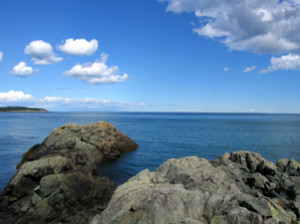
Little River Island is located at the entrance to Cutler Harbor in Downeast Maine (Photo by Bob Trapani, Jr.)
It hasn’t been done in the 164 year history of the lighthouse. But volunteers from Maine’s Little River Lighthouse located on a remote island off the coast of Cutler want to change that. They want to have a lone caretaker live on the island in isolation during the brutal winter months, as well as, year ‘round as part of a unique educational program that has never been done before. So, the Friends of Little River Lighthouse have launched a new program called the “Lighthouse Endeavor.”
Their plan is an ambitious undertaking, especially since there is no heat in the keeper’s house. The Coast Guard ripped out the heating system years ago. A wood pellet stove will need to be purchased and installed. Also, the fair-weather dock and floats for safe access to the island must be removed in the winter months to avoid being destroyed in the winter storms that are so prevalent in this area. This will require the modern-era lighthouse keeper to have a small boat that can easily be brought up the boat ramp and into the boat house. The group does not have a small dory or inflatable with an outboard, but hope to have one donated. Years ago the ramp into the boat house was removed when the lighthouse was abandoned by the Coast Guard and the old winch is no longer usable. So, a new hand operated winch will have to be obtained.

Bill Kitchen, shown in the Hardy Boys boat, is the modern day "keeper" who will be facilitating Lighthouse Endeavor (Photo by Ann-Marie Trapani)
No longer do government lighthouse tenders deliver food, fuel, or other supplies. The modern day lighthouse keeper will need to have a supply of food on hand, perhaps for long periods of time when it is not possible to safely travel to and from the island. Plus this modern era lighthouse keeper will require a stipend to pay his bills. There will not be a government paycheck like the lighthouse keepers of yesteryear received.
The lighthouse keepers of yesteryear who lived on the island never lived there alone and always had family or other keepers with them. However, the modern day keeper will be there alone, by himself. Although having a modern day keeper living at the lighthouse in the off-season will also help deter vandalism and the heating of the house will prevent the plaster from cracking and falling off the walls and having to be repaired each spring, this is not the primary mission of the Lighthouse Endeavor.
In fact, the Lighthouse Endeavor has been designed as a unique platform. Its primary mission is to be an on-site and distance-learning program that will address a wide range of subjects from technology to ecology and math to preservation, as well as history. In order to make the program universally accessible to educators, organizations, and the general public, the Lighthouse Endeavor will also provide a multimedia chronicle of the daily life of the modern day keeper and the life of the island through the seasons.

Technicians from Axiom Technologies installing an antenna on rock on a secluded part of Little River Island offshore from Cutler, Maine. (Photo by Bill Kitchen)
However, in order to be able to get the Lighthouse Endeavor off the ground, the project would require access to the Internet. A satellite dish on this island would not be practical for a number of reasons, mainly because historic regulations would not allow one to be attached to the keeper’s house and, in an area known for its, days on end of, thick fog, would not be useful.
So the friends group turned to Axiom Technologies of Machias, Maine, a company that specializes in getting wireless broadband Internet services to remote areas. When presented with the Lighthouse Endeavor proposal, the president of the firm, Susan Corbett, made a personal visit to the island to get a better understanding of what the Friends of Little River Lighthouse was trying to accomplish. Apparently she was impressed. Soon she had her company’s technicians busy at work to find a way to get wireless access to the island in a way that would not interfere with the historical integrity of the property. Within a few weeks, the technicians were able to make Internet service available to the island.
Susan Corbett said, “Axiom Technologies is pleased and was excited about the opportunity to design and create broadband connection for the remote location at Little River Lighthouse. We support their Lighthouse Endeavor that we believe through its mission to educate and teach through technology also strongly supports our mission to help change the economic status of a region.”

Machias Savings Bank has stepped forward with the necessary funds to repair the chimney atop the keeper’s house (Photo by Bob Trapani, Jr.)
More help then came from the Machias Savings Bank who stepped forward with the necessary funds to repair the chimney atop the keeper’s house. This was followed by a generous offer from Dave and Cheryl Corbett of Massachusetts, whose grandfather, Willie W. Corbett, was the last lighthouse keeper of U.S. Lighthouse Service and the first Coast Guard lighthouse keeper to serve at Little River Lighthouse. He served there from 1921 to August 1, 1944 having joined the Coast Guard in 1939 when it took over the duties of the old U.S. Lighthouse Service. The Corbett’s offered to underwrite the full cost of insulating the water pipes.
Just who would want to undertake this arduous task of living on a remote island lighthouse, by himself, in isolation? That task goes to Bill Kitchen who has been a volunteer at the lighthouse for the past three years. He and his wife, Deb, first visited the island lighthouse as paying overnight guests. The couple immediately fell in love with the lighthouse, the island, and the area. They have returned every summer as volunteers and caretakers. But this will be different. Bill’s wife Deb, who is a school teacher, will stay in Massachusetts and Bill will be at the lighthouse by himself. How does Bill’s wife feel about the Lighthouse Endeavor? She supports him 100%, well almost 100%, saying that if the money can be raised for the Lighthouse Endeavor, Bill should pursue the project while he’s still young enough to do it, saying, “He may not make any money doing this, but adventurous opportunities like this may only be available once in a lifetime.”
Bill, who recently became a licensed teacher having spent most of his career as an award-winning marketer and event producer said the Lighthouse Endeavor is similar to producing an event, but with many more challenges. “Besides,” he jokingly said, “I spent 15-years of my life living on an island; this island is just a little bit smaller and with a few less amenities than Manhattan.” However, Bill is the first to admit that the project will be challenging, but the educational possibilities will make it all worth while.”

Looking east towards Grand Manan Channel from Little River Light Station (Photo by Bob Trapani, Jr.)
“We now have wireless broadband Internet connection that will allow us to make daily reports and post photographs directly from the island to our web site and other sites such as Facebook as well as communicate with educators and schools.,” says Bill. The Friends group also hopes to eventually use the wireless broadband installed by Axiom Technologies to establish web cams at various locations on the island. Since cell phones rarely work on the island they also hope to eventually have phone service through the wireless broadband.
Proving how dedicated Bill is to the Lighthouse Endeavor at Little River Lighthouse, he just turned down a lucrative job offer to pursue this project. That’s what his supporters call, dedication.
“Little River Lighthouse was once listed as one of Maine’s Ten Most Endangered Historic Properties by Maine Preservation and many said it could never be saved, but is was, thanks to the generosity and help of a whole lot of people,” said Kathleen Finnegan Secretary of the Friends group. “And we are now hoping that many of those same people, as well as new ones, will come forward to help us again to write the next chapter in the life of this historic lighthouse.”

Little River Light Station is cared for by the Friends of Little River Lighthouse and owned by the American Lighthouse Foundation (Photo by Bob Trapani, Jr.)

